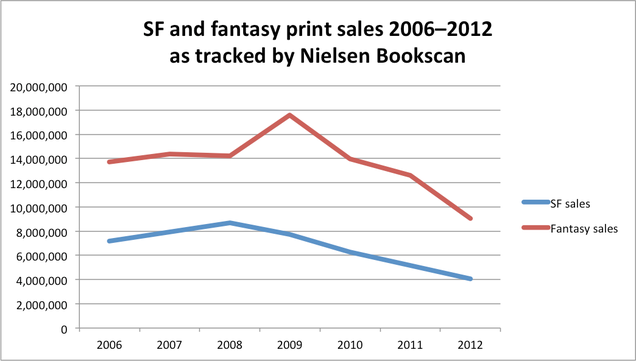As you might expect, Brad Torgersen’s response to the Toad of Tor and the carnival of the grotesque on display at Making Light is considerably more polite and measured than mine. But it is equally dismissive in substance:
We’re about a week out from the release of the final ballot results, for the 2015 Hugo awards. These results will determine which picks are available for your choosing when it comes time for you to cast your ballot. Best Novel, Best Short Story, etc. Already, the critics of Sad Puppies 3 have been laying the groundwork for de-legitimizing SP3. To include statements which completely misunderstand the point of Sad Puppies. Some of it is innocent. Not everybody’s had time to do a deep-dig on the history of Sad Puppies, nor to be able to discern that each iteration of the project has tended to assume its own personality. What they’re hearing about SP3 is probably hear-say from friends, and much of that is at least one to two years out-of-date. And even then, many of the “facts” put forth are demonstrably wrong.
But other commentary is not so innocent. There are people who find the very existence of Sad Puppies 3 to be an affront to their personhoods. A sinister outside force come to trouble their precious genre and its establishment. For the people deliberately misconstruing the purpose and thrust of Sad Puppies 3, it’s all about getting out in front and shaping a narrative. They’re smart. They know that truth can be overwhelmed with lies if you just spin your narrative adroitly, and with enough volume.
Thus the charges, in no particular order.
● SP3 is a trojan horse effort conducted by and for the benefit of authors who cannot earn a Hugo award the honest way.
● SP3 is just ballot-stuffing, which ought to be disallowed according to precedent and the rules of ballot-counting established through WSFS.
● SP3 is artificially trying to warp the Hugos out of true; an outside effort conducted by and involving people who are not real fans.
● The SP3 slate works are substandard based on (insert garbledy-garble talk about taste here.)
● The SP3 slate is just a bunch of right-wingers who should go set up their own awards, and leave the Hugos alone.
● SP3 is not legit because its participants were drafted for the effort, and are not willing participants.
● SP3 is not legit because Larry Correia is a terrible human being who is hated by all real fans.
● SP3 is not legit because Vox Day is also running Rabid Puppies and everybody knows Vox Day is also a terrible human being who is hated by all real fans.
● SP3 is a trojan horse for GamerGaters, and all real fans hate and loathe GamerGaters.
● SP3 is just a bunch of straight white guys who are terrified of women, gays, trans, and folks with brown skin.
● SP3 would never happen in the first place if (resurrected conservative editor of the past) could lecture them about their wrongdoing.
● SP3 is a fringe minority faction that does not represent the “main body” of real fans.
● SP3’s slate selections are not the “natural” selections of real fans.
There’s more, but I think you get the gist of it.
Much of this is simply the “in” crowd reacting badly to watching the “out” crowd take a seat at the lunch table. As I’ve mentioned before in this space, according to the dyed-in-the-wool denizens of WSFS and Worldcon, a “real fan” is defined as someone who has been attending Worldcon (and other cons) for a long time, has been properly inculcated into the specific culture of Worldcon and con-going fandom, is someone who volunteers time and effort to cons, generally makes Worldcon (and con-going) a “family” affair, etc. So if you don’t go to Worldcon and you’ve not been part of that culture for a number of years, you don’t qualify as a “real fan” in their definition. And they resent the hell out of anyone who is not a “real fan” showing up to vote on the “real fan” award.
Imagine that, an SJW trying to deceitfully shape the narrative in her favor. Keep in mind that Brad is addressing those who are still running around saying demonstrably untrue things like “Vox Day is the originator of Sad Puppies” and “Spacebunny does not exist”. These SJWs are not so much insane as willfully delusional. I have no doubt that I could show up at Sasquan with Spacebunny and some of them would claim that I somehow managed to find and hire an escort who happens to look just like the model whose pictures I’ve been using to make it look as if I am married to a slender and attractive woman. Because #GamerGate. And also, raciss.
Of course, they know better, but they’re perfectly willing to lie for rhetorical effect. Which raises the question: once you know that, why would you believe a single word that comes out of their mouths? The good thing is that it is easy to destroy their narrative. Because it is false, all that is necessary to do so is to relentlessly tell the truth.
Since 1986, Tor Books has 84 Hugo and Nebula Best Novel nominations. In 2014, Tor.com had 50 percent of the short story nominations, 40 percent of the novella nominations, and 20 percent of the novelette nominations. Tor has also won the Locus Award for Best Publisher for 26 straight years, beginning in 1988.
Keep that in mind when you read the Toad of Tor’s claims about people being afraid of losing their privilege.

